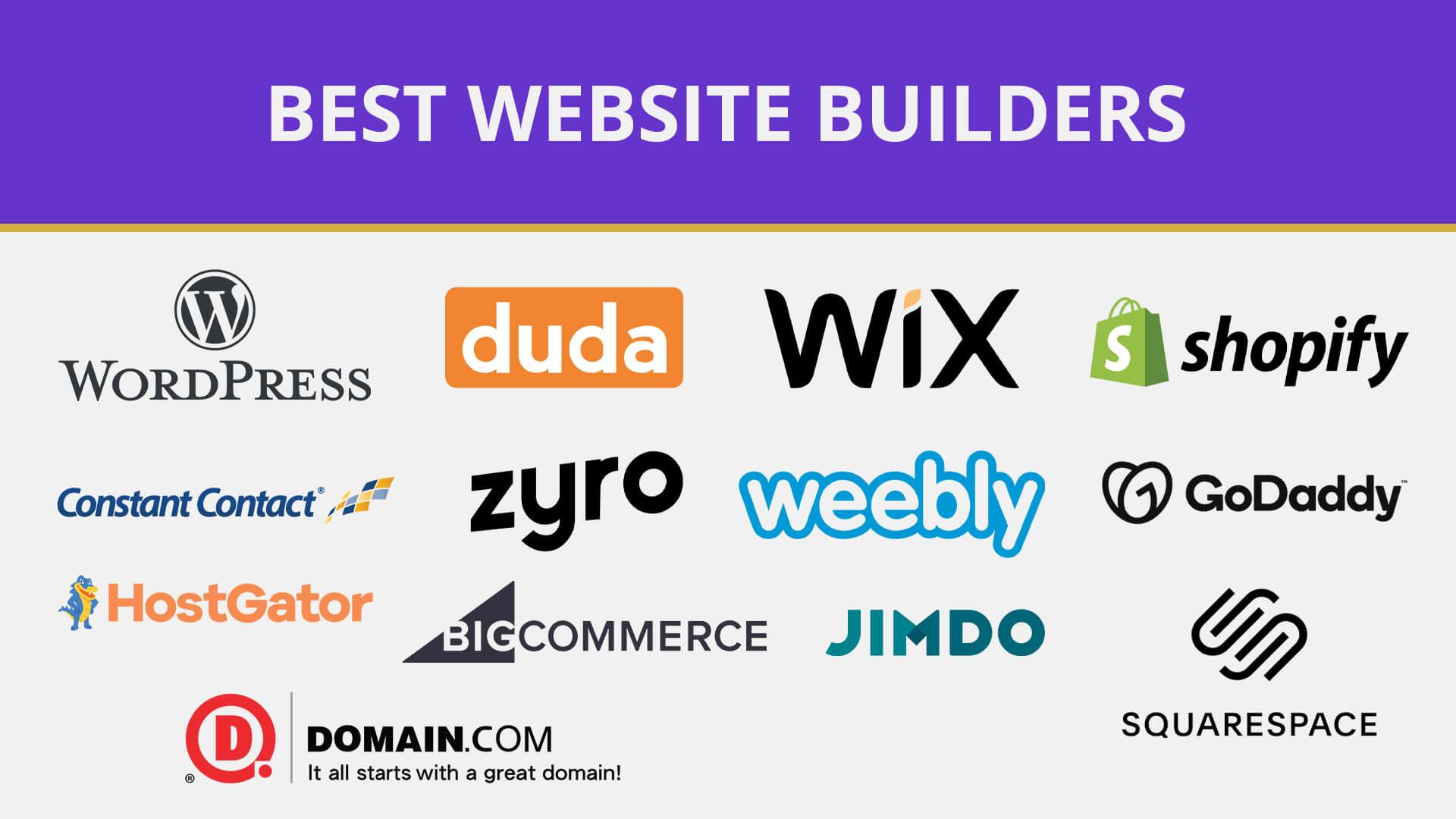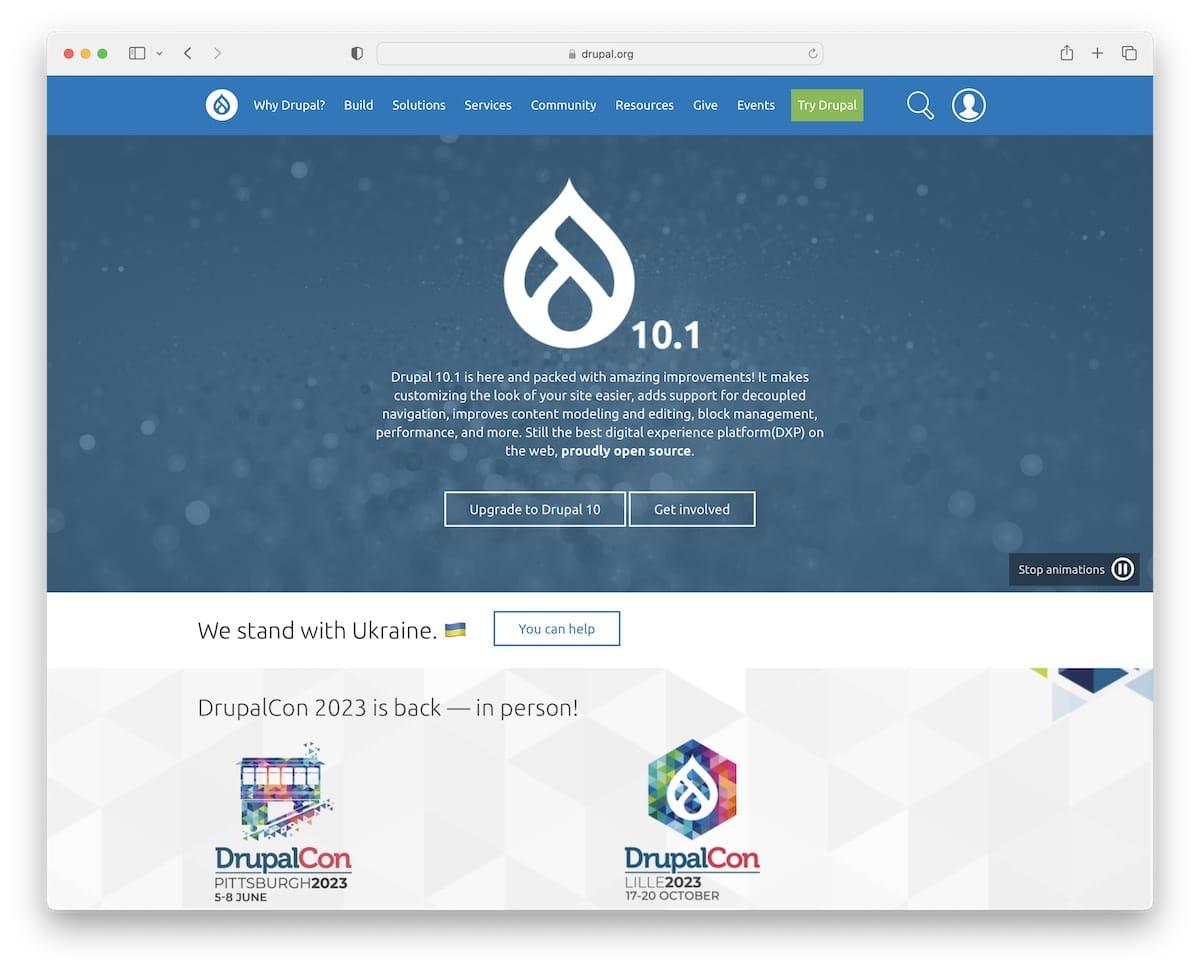Looking to build a stunning website without breaking the bank? Check out our roundup of the 7 best open-source website builders for 2025! We’ll compare features, ease of use, and customization options to help you find your perfect match. Let’s dive in!
7 Best Open Source Website Builders 2025 (Compared)
Are you ready to take your online presence to the next level without breaking the bank? In a world where having a stunning website is essential for personal branding, businesses, and everything in between, the right web builder can make all the difference. Luckily, open source website builders are here to save the day! They offer flexibility, customization, and a vibrant community to back you up, all while keeping your wallet happy.
In this article, we’re diving into the 7 Best Open Source Website Builders of 2025. Whether you’re a seasoned developer or a newbie just starting out, we’ve got you covered. We’ll compare features, usability, and support to help you find the perfect fit for your needs. So grab a cup of coffee, sit back, and let’s explore how these powerful tools can transform your web building experience!
Choosing the Right Open Source Website Builder for Your Needs
When it comes to building your website, the choices are seemingly endless, particularly in the realm of open source solutions. To ensure you select the best platform to match your needs, consider the following key factors:
- Customization: Look for a website builder that offers extensive customization options. This will allow you to create a unique site that aligns perfectly with your brand identity.
- Community Support: A vibrant community can be a lifesaver. Platforms with strong user support can provide tutorials, troubleshooting tips, and plugins to enhance functionality.
- Ease of Use: Not everyone is a tech wizard. Choose a builder that offers an intuitive interface, making it easy to design and manage your site without needing in-depth coding knowledge.
- Responsive Design: With mobile traffic on the rise, ensure the website builder you choose prioritizes responsive design. This will ensure your site looks great on all devices.
- SEO Capabilities: If you want your website to be found, look for SEO-friendly features. This ensures you can easily optimize your site for search engines.
It’s also essential to evaluate the specific features and functionalities offered by each open source website builder. Here’s a quick comparison of some popular options:
| Website Builder | Customization | Support | Ease of Use |
|---|---|---|---|
| WordPress | High | Extensive | Moderate |
| Joomla | Moderate | Good | Challenging |
| Drupal | Very High | Robust | Complex |
| Grav | Moderate | Growing | Easy |
Beyond the basics, consider the long-term growth and scalability of your chosen website builder. You want a platform that can evolve with your needs, accommodating future enhancements or expansions as your business grows. Look for builders that support integrations with various tools, plugins, and services to enhance functionality without overhauling your entire site.
Ultimately, the right open source website builder for you will balance your immediate needs with your long-term goals. By carefully assessing the options available, you can make an informed decision that empowers you to create a stunning, effective online presence.
Exploring the Top Features of Each Builder
When diving into the realm of open source website builders, it’s crucial to understand what each one brings to the table. From user-friendly interfaces to extensive customization options, the features vary widely, allowing users to select the best fit for their needs.
WordPress
Renowned for its flexibility, WordPress powers over 40% of websites globally. Here are some standout features:
- Extensive Plugin Ecosystem: Thousands of plugins enhance functionality without requiring coding skills.
- Customizable Themes: Countless themes allow users to design their site’s look and feel.
- SEO Friendly: Built-in features and plugins like Yoast SEO help optimize content for search engines.
Joomla
Joomla strikes a balance between user-friendliness and technical capabilities. It’s particularly favored for its:
- Multilingual Support: Easily create sites in multiple languages, catering to global audiences.
- Access Control Levels: Advanced user management allows for customizable access permissions.
- Content Management: A robust content management system that supports complex structures.
Drupal
For those who crave more control over their website, Drupal is a powerful contender. Its notable features include:
- Custom Content Types: Build content tailored to your needs, from blogs to portfolios.
- Strong Security: Frequently updated with security patches, making it ideal for enterprise-level sites.
- Community Support: A vast community offers help and resources for users.
Grav
Grav stands out for its flat-file architecture, making it lightweight and fast. Key features include:
- No Database Needed: Simplifies installation and maintenance by using files instead of a database.
- Customizable and Extensible: Easily create custom themes and plugins to suit your needs.
- Markdown Support: Write content in Markdown for a streamlined writing experience.
OctoberCMS
With a modern approach to content management, OctoberCMS offers a refreshing take with its:
- Laravel Framework: Built on the powerful Laravel framework, offering developers a robust toolkit.
- Easy Customization: Simple to modify themes and plugins to create a unique experience.
- Backend User Experience: Intuitive interface that enhances the user experience for content creators.
PageKit
If you’re looking for simplicity without sacrificing power, consider PageKit. Its features include:
- Modular System: Add or remove modules as needed to tailor functionality.
- Visual Editor: A drag-and-drop visual editor makes page creation a breeze.
- Responsive Design: Ensure your site looks great on all devices with built-in responsive features.
Ghost
For those focused on content creation and blogging, Ghost is a minimalist powerhouse. Key features are:
- Markdown Support: Write content in Markdown for quick and easy formatting.
- Simplified Interface: A clean, distraction-free writing environment.
- SEO and Analytics Built-In: Tools designed to help grow your audience right out of the box.
User Experience and Accessibility Matters
When it comes to building a website using open-source tools, the importance of user experience (UX) and accessibility cannot be overstated. These two elements play a critical role in ensuring that your website not only reaches your target audience but also provides them with a satisfying experience. A well-designed website should be intuitive, easy to navigate, and inclusive for all users.
First off, let’s talk about user experience. A positive UX design means that visitors can find what they’re looking for without unnecessary clicks or confusion. This can be achieved through:
- Clear Navigation: Menus should be straightforward, allowing users to easily explore your website.
- Responsive Design: Your site should look and function well on various devices, ensuring consistency across platforms.
- Fast Loading Times: Users tend to abandon sites that take too long to load, so optimizing performance is key.
Now, let’s shift our focus to accessibility. Making your website accessible means that it can be used by people of all abilities and disabilities. This is not just about compliance with legal standards; it’s about creating an inclusive digital environment. Here are some crucial aspects to consider:
- Alt Text for Images: Descriptive text helps visually impaired users understand visual content.
- Keyboard Navigation: Ensuring your site can be navigated without a mouse is essential for users with motor disabilities.
- Color Contrast: A strong contrast between text and background can greatly enhance readability for users with visual impairments.
To illustrate how these principles can be integrated into open-source website builders, consider a comparison table of popular platforms that excel in UX and accessibility features:
| Website Builder | UX Features | Accessibility Features |
|---|---|---|
| WordPress | Customizable themes, intuitive dashboard | Screen reader support, alt text options |
| Joomla | Flexibility, extensive menu options | Accessibility-ready templates, ARIA support |
| Drupal | Advanced user management, user-friendly interface | Accessible forms, keyboard navigation |
Ultimately, selecting an open-source website builder that prioritizes both user experience and accessibility is crucial for achieving lasting success. Not only will it enhance your website’s effectiveness and engagement, but it will also demonstrate your commitment to inclusivity and a wider audience reach. Remember, a great website is one that everyone can use!

Customization and Flexibility: Making Your Site Unique
One of the standout features of open source website builders is their ability to offer endless customization options. Unlike proprietary platforms that may restrict your design choices, open source solutions empower you to truly make your website your own. With access to the underlying code, you have the freedom to tweak, modify, and optimize every aspect of your site. Want to change the layout? Go ahead! Looking to adjust the color scheme to match your brand? Easy as pie!
Furthermore, the flexibility of these builders means you can choose from a myriad of pre-built themes and plugins, or even create your own from scratch. This allows you to tailor your site not just in terms of aesthetics but also functionality. Whether you need an e-commerce platform, a portfolio showcase, or a personal blog, the right open source website builder can adapt to your specific needs.
Another major advantage is the community-driven support that comes with many open source projects. Users around the globe are constantly contributing new themes and plugins, making it easier than ever to enhance your site. This collaborative environment fosters creativity, allowing you to integrate unique features that your competitors may not have. Plus, with a few clicks, you can find tutorials and forums dedicated to helping you implement these customizations effectively.
Here’s a quick comparison table of some popular open source website builders and their customization capabilities:
| Website Builder | Customization Options | Plugin Support |
|---|---|---|
| WordPress | Unlimited themes & custom CSS | Over 58,000 plugins |
| Joomla | Flexible templating system | Thousands of extensions |
| Drupal | Custom content types | Rich ecosystem of modules |
In addition, many builders offer responsive design options to ensure your website looks great on all devices. This is critical, as more users access the web from their smartphones and tablets. With open source platforms, you can customize the mobile experience just as effectively as the desktop version. After all, providing a seamless experience for your visitors can significantly boost user engagement and satisfaction.
Lastly, the scalability of open source website builders cannot be overstated. As your business grows, you can easily expand your site’s features and capabilities without a hitch. Whether it’s integrating a new payment gateway, adding SEO tools, or expanding your blog, these platforms are built to grow with you. This adaptability not only enhances your site’s performance but also ensures that your investment continues to pay off long into the future.

Community Support and Documentation: Why It Matters
When choosing an open-source website builder, one of the most crucial factors to consider is the strength of its community support and the quality of its documentation. A vibrant community can significantly enhance your experience, whether you’re a beginner or a seasoned developer. These communities often serve as a treasure trove for troubleshooting, tips, and innovative ideas that can take your website to the next level.
Good documentation is your best friend when navigating the complexities of website building. It provides you with invaluable resources, such as:
- Tutorials: Step-by-step guides that simplify the building process.
- FAQs: Answers to common queries that can save you time.
- Code snippets: Ready-to-use code that can enhance functionality.
Imagine running into a roadblock while creating your website. If your chosen platform has an active community, you can often find answers within minutes. Community forums and discussion boards can be a rich resource where users share their experiences, solutions, and even custom themes or plugins. Being part of a community means you’re never truly alone in your web-building journey.
Furthermore, participating in community discussions can give you insights into new features or updates that you might not find in official documentation. Many platforms often release updates based on user feedback, and being engaged in the community means you can voice your opinions and contribute to the development process.
To give you a clearer picture, here’s a comparison of community support and documentation quality among the top open-source website builders:
| Website Builder | Community Size | Documentation Quality |
|---|---|---|
| WordPress | Large | Comprehensive |
| Joomla | Moderate | Informative |
| Drupal | Active | Detailed |
| Grav | Growing | User-Friendly |
Ultimately, investing time in selecting a website builder with robust community support and excellent documentation can save you from future headaches. It empowers you to focus on creativity rather than getting bogged down by technical issues. So, as you explore your options, remember that a supportive community and thorough documentation can make all the difference in your website-building experience!

Performance and Security: Keep Your Site Safe and Fast
When it comes to building a website, performance and security are two critical elements that can make or break your online presence. Fast-loading pages not only enhance user experience but also improve your search engine rankings. Open-source website builders often come with built-in optimization features, allowing you to achieve a balance between performance and functionality.
One of the standout advantages of using open-source platforms is the flexibility they offer in terms of performance tuning. Many builders provide options to:
- Compress images: Reducing file sizes without sacrificing quality.
- Minify CSS and JavaScript: Eliminating unnecessary code to speed up loading times.
- Leverage browser caching: Storing static resources to improve load speed for return visitors.
However, with great power comes great responsibility. Security is a paramount concern that should never be overlooked. Open-source solutions are often targets for malicious attacks, so ensuring your site is secure is equally as important as its performance. Here are essential security practices you should consider:
- Regular updates: Keeping your software up-to-date protects against vulnerabilities.
- Strong passwords: Use complex passwords and change them regularly to thwart unauthorized access.
- SSL certificates: Encrypting data transferred between your site and its users builds trust and enhances security.
| Performance Features | Security Measures |
|---|---|
| Image Optimization | Regular Software Updates |
| Minified Code | Strong Password Policies |
| Browser Caching | SSL Encryption |
By integrating these performance enhancements and security measures into your website, not only do you provide a better experience for your visitors, but you also create a robust structure that safeguards your content and data. The right open-source website builder can offer these features, ensuring that your site remains both safe and swift, allowing you to focus on what really matters — growing your audience and expanding your online presence.

Cost-Effectiveness: Getting the Most Bang for Your Buck
When it comes to building a website, cost-effectiveness is a crucial factor that every business owner should consider. Open source website builders offer an appealing solution not only for startups but also for established companies looking to scale. These platforms provide a wealth of features without the hefty price tag, allowing users to allocate resources more efficiently. Let’s explore how you can maximize your investment.
Open source website builders typically operate on a freemium model, meaning you can start without spending a dime. This often includes access to basic features that are more than sufficient for many users. As your website grows, you can enhance its functionality by opting for premium plugins or additional themes, which can be purchased as needed. This flexibility allows you to pay for what you need, rather than committing to a high upfront cost.
Another significant advantage is the community support that comes with many open source projects. Unlike proprietary solutions where customer service may be limited or costly, open source platforms often have vibrant communities filled with experts willing to help. This can translate to substantial savings on technical support and ongoing maintenance costs. You can find tutorials, forums, and even local meetups, which can be invaluable in troubleshooting and learning how to optimize your website.
Let’s take a look at how different open source builders stack up in terms of cost-effectiveness:
| Website Builder | Initial Costs | Licensing Fees | Support Options |
|---|---|---|---|
| WordPress | Free (self-hosted) | None | Community Forums, Premium Support Available |
| Joomla | Free | None | Community Support |
| Drupal | Free | None | Community Forums, Professional Support Available |
Moreover, the ability to control hosting and other expenses is a significant benefit. With open source website builders, you can choose your hosting provider, allowing for a range of pricing options that suit your budget. This empowers you to find the best deals without being tied to a specific vendor. Many hosting providers also offer one-click installations for popular open source platforms, simplifying the setup process and eliminating additional costs associated with hiring a developer.
opting for an open source website builder not only reduces your initial investment but also provides a scalable solution that grows with your business. By taking full advantage of community resources and the flexibility of add-ons, you can ensure that your website remains both effective and affordable. It’s all about making strategic choices that drive value and deliver a strong return on investment.

Real-Life Use Cases: Which Builder Works Best for Different Projects
When choosing an open-source website builder, the right option often depends on the specific needs of your project. Below, we explore real-life use cases to help you find the perfect fit, ensuring your website is not only functional but also visually appealing.
Small Business Websites
For small businesses aiming for a professional online presence without breaking the bank, WordPress stands out as a top contender. Its vast library of themes and plugins makes it incredibly versatile. You can easily integrate features like contact forms, SEO tools, and e-commerce capabilities. Here are some reasons why WordPress is ideal:
- User-friendly interface: Even beginners can navigate with ease.
- Customization options: Thousands of plugins and themes allow for a unique design.
- Community support: A large community means plenty of resources and help.
Portfolio Sites
Creative professionals often seek a builder that showcases their work beautifully. In this case, Joomla! shines with its advanced content management capabilities. Its flexibility allows for stunning galleries and portfolios. Consider these aspects:
- Flexible layouts: Build visually striking portfolio pages effortlessly.
- Multilingual support: Perfect for artists working in diverse markets.
- Built-in SEO features: Enhance your visibility in search engines.
E-commerce Stores
If you’re venturing into e-commerce, Magento is a powerhouse. It’s designed for larger online stores but can accommodate smaller shops as well. Here’s why Magento is worth considering:
- Scalability: Perfect for growing businesses with expanding product lines.
- Robust features: Built-in tools for inventory management, shipping, and payment processing.
- Customization: Highly customizable to fit your brand’s aesthetic.
Blogs and Content Websites
For bloggers and content creators, Ghost is the go-to solution. With a focus on writing and content management, it’s designed to help you publish quickly and effortlessly. Here’s what makes Ghost special:
- Minimalistic design: Distraction-free writing environment.
- Fast performance: Optimized for speed, ensuring quick load times.
- Built-in SEO tools: Help your content reach a wider audience.
Community and Membership Sites
If you’re looking to build a community-driven platform, Drupal should be on your radar. Its powerful user management capabilities make it ideal for membership sites and online forums. Key benefits include:
- Advanced user roles: Tailor access and permissions for different user types.
- Strong security: Robust security features to protect user data.
- Custom content types: Create various types of content tailored to your community.
Comparison Table
| Builder | Best For | Key Feature |
|---|---|---|
| WordPress | Small Businesses | User-friendly interface |
| Joomla! | Portfolios | Flexible layouts |
| Magento | E-commerce | Scalability |
| Ghost | Blogs | Minimalistic design |
| Drupal | Community Sites | Advanced user roles |
Ultimately, the choice of website builder should align with your project’s goals and your level of technical expertise. By understanding what each platform excels at, you can create a website that not only meets your needs but also engages your audience effectively.

Final Thoughts: Making an Informed Decision for 2025
As we look ahead to 2025, the landscape of website builders continues to evolve, offering an array of choices for both seasoned developers and novices alike. Selecting the right open-source website builder is crucial, not just for your immediate needs, but also for your future growth and flexibility. With the options we’ve explored, it’s important to weigh the pros and cons of each platform, considering how they align with your specific goals.
When making your decision, consider the following factors:
- Ease of Use: A user-friendly interface can save you countless hours in development and maintenance.
- Customization: Look for builders that allow for easy modifications to fit your brand’s unique identity.
- Community Support: A vibrant community can be invaluable for troubleshooting and sharing best practices.
- Scalability: Ensure the platform can grow with your business, accommodating increased traffic and new features.
- Cost-Effectiveness: Open-source doesn’t mean free; consider the total cost of ownership, including hosting and potential premium add-ons.
In the table below, we’ve summarized key features of the top contenders to help you visualize your options better:
| Website Builder | Ease of Use | Customization | Community Support | Cost |
|---|---|---|---|---|
| Builder A | ⭐️⭐️⭐️⭐️ | ⭐️⭐️⭐️ | Strong | Free |
| Builder B | ⭐️⭐️⭐️⭐️⭐️ | ⭐️⭐️⭐️⭐️ | Moderate | Freemium |
| Builder C | ⭐️⭐️⭐️ | ⭐️⭐️⭐️⭐️⭐️ | Weak | Free |
Ultimately, the best choice depends on your unique circumstances. Whether you prioritize design flexibility, ease of use, or robust community engagement, there’s a platform poised to meet your needs. As you weigh your options, remember that the right website builder can empower you to create a digital presence that not only looks great but functions seamlessly.
your decision shouldn’t just be about choosing a tool; it should be about laying a solid foundation for your online ambitions in 2025 and beyond. Take your time, evaluate your priorities, and choose a builder that aligns with your vision. The right choice can make all the difference in how you connect with your audience.
Frequently Asked Questions (FAQ)
Q&A: 7 Best Open Source Website Builders 2025 (Compared)
Q: Why should I consider using an open source website builder?
A: Great question! Open source website builders offer a level of flexibility and customization that proprietary solutions simply can’t match. You can modify the code, tailor your website to your specific needs, and, best of all, avoid the ongoing costs associated with subscription-based services. Plus, you join a thriving community of developers and users who share tips, templates, and support!
Q: What are some key benefits of using the best open source website builders in 2025?
A: The benefits are numerous! First, you get complete control over your website’s design and functionality. You can add features as your site grows, and you’re not locked into a specific vendor’s ecosystem. Many open source builders also have robust communities, meaning you’ll find plenty of resources, tutorials, and plugins to enhance your website. Plus, they usually have strong security measures, helping to protect your site from vulnerabilities.
Q: How do I choose the right open source website builder for my needs?
A: Start by considering what you value most. Are you looking for ease of use, extensive customization options, or a specific feature set? Each builder has its own strengths. For instance, some are more suited for e-commerce, while others excel in portfolio design. It’s important to weigh these factors against your skill level and the complexity of your website’s goals.
Q: Can any of these website builders cater to e-commerce?
A: Absolutely! Many open source website builders have robust e-commerce capabilities. Builders like Magento and WooCommerce (which runs on WordPress) are excellent for creating online stores. They offer diverse features such as inventory management, payment gateways, and customizable product pages. If you’re looking to sell products or services, these platforms can be a game-changer!
Q: Are open source website builders suitable for beginners?
A: Definitely! While there is often a learning curve with open source platforms, many of them are becoming increasingly user-friendly. Builders like WordPress, for example, offer intuitive interfaces and extensive documentation. Additionally, you can find numerous tutorials and community forums to help you along the way. So, don’t hesitate! You can start building your dream website even if you’re new to the game.
Q: What kind of support can I expect with open source website builders?
A: Support varies, but one of the joys of open source is the community! You can find forums, user groups, and even dedicated websites for troubleshooting and tips. Some platforms also offer paid support options if you want more personalized assistance. Just remember, the community around these tools is often very passionate and eager to help newcomers!
Q: How do I ensure my website is secure using an open source builder?
A: Security is crucial, and open source builders can be secure—if you take the right precautions. Make sure to keep your software updated, use strong passwords, and consider additional security plugins or features. Many open source platforms have a strong focus on security and frequently release updates to patch vulnerabilities. Always research the security features available with your chosen builder!
Q: What are the seven best open source website builders for 2025?
A: You’re in for a treat! In our article, we dive deep into the seven best open source website builders of 2025, comparing their features, usability, and overall value. You’ll discover the likes of WordPress, Joomla, Drupal, Magento, Grav, Strapi, and Webflow. Each has its unique advantages and use cases, so you’re bound to find the perfect match for your project!
Q: Where can I find more detailed comparisons of these builders?
A: You can check out our full article for an in-depth comparison! We cover everything you need to know—features, pros and cons, and real user experiences. It’s the perfect guide to help you make an informed decision and find the best open source website builder that fits your needs in 2025.
Feel free to reach out if you have more questions or need further guidance! Building a website doesn’t have to be daunting, especially with the right tools at your fingertips. Happy building!
Closing Remarks
As we wrap up our exploration of the 7 best open source website builders of 2025, it’s clear that the right choice can transform your online presence. Whether you’re a seasoned developer or just starting out, these platforms offer flexibility, customization, and control that proprietary solutions simply can’t match.
By opting for an open source builder, you not only gain access to a wealth of tools and features but also join a vibrant community of users and contributors eager to share tips and support. Remember, the best website builder for you will depend on your specific needs, technical expertise, and long-term goals.
So, why wait? Dive into the world of open source website builders and take charge of your online journey today! With the right resources and a little creativity, your dream website is just a few clicks away. Happy building!






